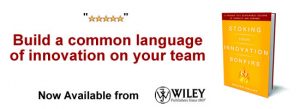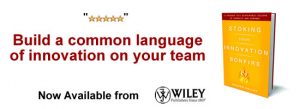Can We Really Quantify Future Innovation Opportunities?
Or Is It Just A False Sense Of Predictability?
 Henry Mintzberg once suggested some twenty years ago that managers need more than just analytical skills to do their jobs well; they also needed the intuitive (right brain thinking), he was right but he didn’t write a book about it. He should have.
Henry Mintzberg once suggested some twenty years ago that managers need more than just analytical skills to do their jobs well; they also needed the intuitive (right brain thinking), he was right but he didn’t write a book about it. He should have.
Intuition is hard for many and good use of intuition often requires deep introspection. Chester Barnard in The Functions of the Executive (1968) suggested that managers use non-logical decision-making, which balances rational and intuitive.
“I have found it convenient and significant for practical purposes to consider these mental processes consist of two groups, which I shall call ‘non-logical’ and ‘logical’. These are not scientific classifications, but I shall ask you to keep them in your minds for the present, as I shall use them throughout this lecture. In ordinary experience the two classes of intellectual operations are not clearly separated but meld into each other. By ‘logical processes’ I mean conscious thinking which could be expressed in words or other symbols, that is, reasoning. By ‘non-logical processes’ I mean those not capable of being expressed in words or as reasoning, which is only known by judgment, decision or action.”
Not that I suggest we need to start a MA degree in Strategic Intuition. Although it might attract a good number of students, I think it should be part of business school foundational teachings. I teach this at my Harvard Design Thinking Program and other in-company programs, people were excited as if they have just discovered this untapped potential. Intuition is something that should be reorganized and managed like any other element in the decision-making environment, particularly in a team environment.
The over reliance on quantitative analytics are common, numbers are very important, but it needs to be combined with other things. Often the most promising innovative ideas with long-term strategic upside are exactly those that are impossible to quantify. And they ended up being shelved.
Freek Vermeulen of London Business School just wrote a very good piece on how insisting on early quantitative validation is creating a problem. He said the reason why companies are still so eager to see numbers because the long-term, uncertain aspects of strategic investment decisions make us rather insecure whether we’d be doing the right thing; therefore, we really would like to see some numbers to lull ourselves into the belief that we’ve been thorough and have uncovered the facts and have a solid basis on which we’re accepting or rejecting the proposed course of action. Of course that’s just make-belief (you can make numbers say whatever you want them to say) and may make you quite myopic; missing the things that are difficult to quantify but just as important.
He is obviously not suggesting that we should get rid of numbers in strategy altogether. Heck no; forcing yourself to go through some sort of quantifying exercise can sometimes make you uncover and realize things that you hadn’t thought of before. He suggests that once we’ve carefully and painstakingly produced all the numbers then toss them aside and sort of make a decision based on our gut feel and experience. Very good advice.
Don’t miss an article (3,000+) – Subscribe to our RSS feed and join our Innovation Excellence group!
 Idris Mootee is the CEO of idea couture, a strategic innovation and experience design firm. He is the author of four books, tens of published articles, and a frequent speaker at business conferences and executive retreats.
Idris Mootee is the CEO of idea couture, a strategic innovation and experience design firm. He is the author of four books, tens of published articles, and a frequent speaker at business conferences and executive retreats.
NEVER MISS ANOTHER NEWSLETTER!
LATEST BLOGS
The Evil Downside of Gift Cards
This past holiday season I saw probably one too many articles trumpeting the value of gift cards to retailers and how they are a great thing for retailers. My skeptic side starts coming out as I see article after article appear, and I have to start asking “Is the increasing prevalence of gift cards as a holiday gift (primarily Christmas) a good thing for retailers?”
Read MoreWhy the iPhone will not succeed – Yet
The new Apple iPhone is set to launch on June 29, 2007 and the press and investors are making it a darling. Investors have run Apple’s stock price up from about $85 per share before its announcement to $125 per share recently, but the iPhone still will not succeed – at least not yet.
Read More



